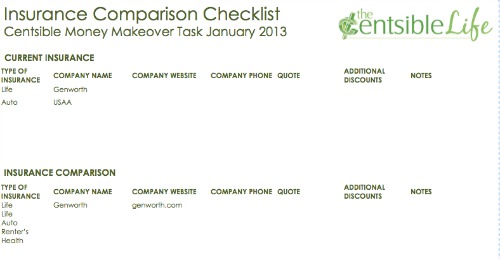A huge part of personal finance is planning ahead. Insurance is one area where it makes sense to spend a little to insure that you have coverage in case a catastrophe hits. Since we’re starting the New Year off on the right foot with the Centsible Money Makeover, examining your insurance is a smart financial move for January.
Insurance isn’t meant to replace regular maintenance (for your car, health or your life)-rather it’s a cushion like your emergency fund. It’s meant to be there in case you need it. <knock on wood>
There are two parts of evaluating your insurance needs. The coverage you need and the amount the insurance costs, and several types of insurance you need to consider: health, life, auto, and homeowner’s or renter’s insurance.
Evaluate your current insurance needs.
Life Insurance:
Life insurance needs vary greatly, so using a calculator is a good indicator of how much insurance you need.
- How much debt do you have? Include your mortgage and all debts.
- Who is dependent on your income? Do you have kids, a spouse, parents, or other family members who are dependent on your income?
- How old are your dependents? If you have young children (or plan on having children) consider a policy that will last through their childhood and help pay for their college so that there is less burden on the other providers or guardians in your family.
I recommend term life insurance because it’s generally the most affordable and smart option for everyone. While some employers offer life insurance it’s typically better to shop for life insurance on your own.
More to read: Insurance 101, How much life insurance do I need? and Don’t Fear the Reaper, Plan Now
Health Insurance:
Health insurance is extremely important, but it can be difficult to afford for many families. Even with the affordable care act in place many families are still without health insurance. The number one reason for bankruptcies is medical expenses. Knowing how easy it is to go into debt for medical expenses even a catastrophic medical plan is better than none.
There are a variety of options for families without insurance including CHIP (for kids), Medicaid and Medicare (for those who qualify), and high deductible plans which offer affordability but coverage in case of major health issues. Healthcare Savings Accounts (HSAs) are a great counterpart to high deductible plans and act like a medical savings account.
More to read: Info from the US government including CHIP (insurance for kids) and 25 Ways to Save on Healthcare
Auto Insurance:
Auto insurance is necessary to cover car accidents and medical expenses that are related to auto accidents. It’s both for your own protection (in case you are at fault), but also so that you have coverage should someone else cause an accident. Again you’ll have to do the math.
- How much do you have saved for a deductible?
- How old is your car? (you can do without certain coverages if your car is older and paid off in some states)
- What extras do you need or want? Towing coverage? Rental car coverage?
More to read: 11 Ways to Save on Auto Insurance
Homeowner’s or Renter’s Insurance:
Another necessary expense to protect your home and belongings. While mortgage companies require proof of homeowner’s insurance you have a variety of options including size of your deductible, extra coverages that may be necessary (flood insurance for instance), and ensuring that the value of not only your home, but your belongings are fully accounted for.
Renter’s often aren’t required to have insurance, but should. The cost is minimal and because you have less control over your environment (neighbors, landlords, etc.) it’s a good way to protect your belongings. For example when I was living in a ground floor apartment the upstairs neighbors moved in a waterbed which sprung a leak and ruined our bed. While we didn’t have insurance at the time (we got it the day after it happened!) the management company required approval of waterbeds, and since our neighbors hadn’t gotten approval they were forced to pony up funds to replace our bed. It could have been much worse though, and since then I always encourage renters to get insurance.
More to read: 11 Tips to Reduce your Homeowner’s Insurance and Ways to Save on Renter’s Insurance
Evaluate the cost of your insurance policies.
In some cases you have no choices, but in many cases you can shop around for a better deal or consider your options. Between multi-policy discounts, special pricing offered, and changing insurance needs you can save a huge amount of money by evaluating your needs once a year.
Multi-policy discounts:
Often if you have more than one policy through an insurer they will offer you a discount, sometimes quite a significant one! The more policies you carry with your insurer the bigger the discount.
Loyalty discounts:
If you remain a loyal customer of your insurance company they may offer you a loyalty discount after a certain number of years.
Switch insurance providers:
A huge part of evaluating your insurance needs is to look at other providers for quotes. There are a variety of options for price comparison, but I find it best to call or use the company’s website directly to get a quote.
Change your policy:
You may have a change in your life or circumstances that directly impacts your insurance. If you have children it’s obvious you need to re-evaluate your needs. Other times to evaluate your needs: changing or quitting your job, moving to another home or state, paying off debts, among others.
Check for discounts:
For instance our credit union offers a discount on insurance through a particular provider. They were able to come in $300+ lower per year than any other provider over the last 5 years. That’s saved us over $1,500 in the 5 years we’ve lived in out home.
Insurance Comparison-January 2013’s Centsible Money Makeover Task
This checklist is printable or you can adapt it in Excel as you compare insurance options.

Download the Insurance Comparison Checklist
Note: While there are a variety of other types of insurance, most require the same kind of math. It’s a little tough to look at your life and belongings in terms of a number, but in the end it is about protecting what you have.
Kelly
Disclosure:Post presented by Genworth Financial, all opinions are my own.
















Pingback: Financial Planning & NestWise - Centsible Life — Centsible Life